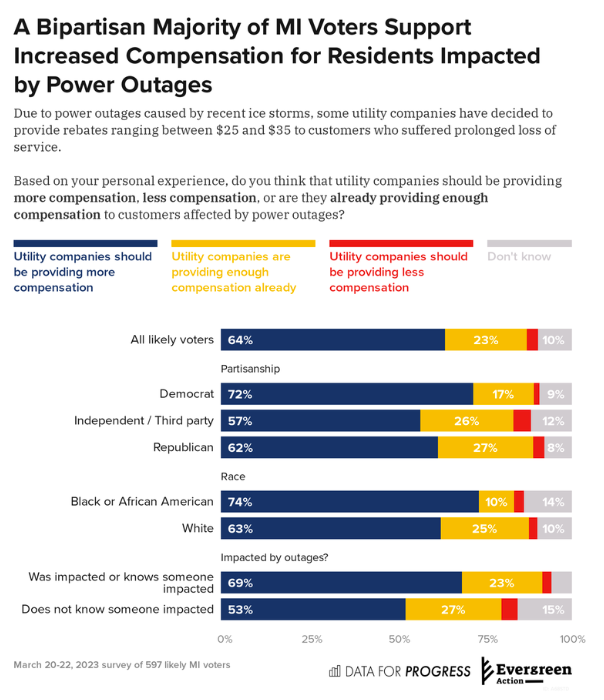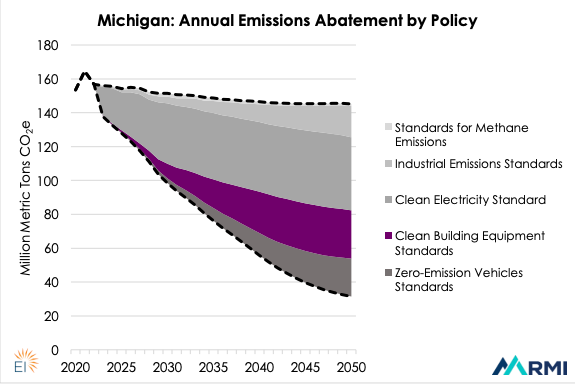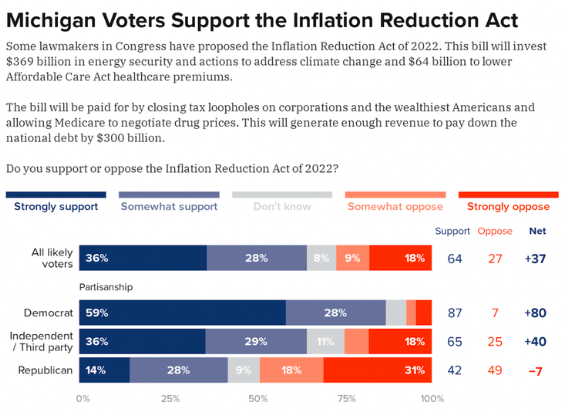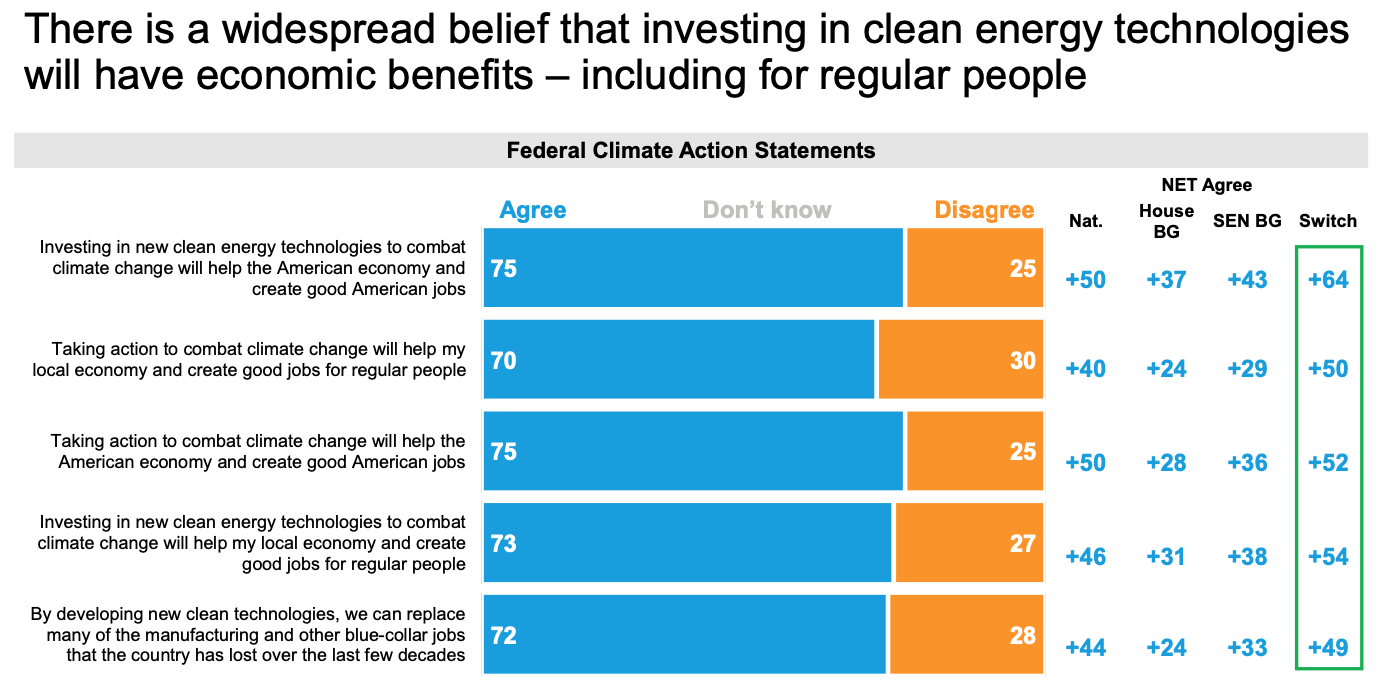Resources
Search below for resources covering the intersection of climate engagement, social science and data analytics.
RESULTS
Poll: Voters in Key Farm Bill States Support New Approaches to the Food and Farm Bill
Amid Farm Bill negotiations, voters in key states are more likely to support political candidates who want to help farmers to adapt to extreme weather and to be part of the solution to climate change. Voters in the four states are highly motivated in their support for programs that would help farmers adapt to extreme weather and mitigate climate change. Majorities in Colorado (69%), Georgia (66%), Michigan (65%) and Pennsylvania (70%) said they would be more likely to support a candidate for office who offered ideas along those lines. Large majorities in each of the four states, upwards of 76% of voters, identified corporate consolidation that squeezes small and midsize farmers and food businesses as a threat in their state. Notably, that jumped to 89% of households with a farmer. Majorities in every state, with a high of 89% in Pennsylvania, supported increasing investments that help small and midsize farmers compete with large corporate agribusiness. Very large majorities of voters supported programs that help farmers protect water quality and keep more carbon and nutrients in their soil, from 86% in Georgia to a high of 88% in Michigan and Pennsylvania. Majorities of voters in each state – as many as 68% in Michigan – and 66% of voters with a farmer in the house said water pollution caused by agricultural runoff is a threat to their state.
Poll: Rural voters may be swingable
While partisanship remains strong among the rural electorate, more than one-third (37%) of rural voters appear "swingable" in future elections, depending on resonant policy proposals and messaging. Three messaging points — lowering prices; bringing good-paying jobs to local communities; and a populist message focused on corporate greed — received such broad support that they rivaled voters’ agreement on core values like family and freedom. Read additional analysis in the Daily Yonder's coverage.
Poll: Michigan Voters Support Clean and Affordable Energy Solutions in the Wake of Prolonged Power Outages
Voters overwhelmingly support major provisions of the MI Healthy Climate Plan and the transition to a fully clean electricity grid. By a 61%-33% margin, Michigan voters support the state moving to a 100% clean energy electricity grid by 2035, including 88% of Democrats and 30% of Republicans. 64% support utility companies providing enhanced subsidies for consumers during blackouts. 70% support strengthening the MI Public Service Commission mandate to consider reliability, resilience against extreme weather, pollution reduction, and energy affordability in its decisions.
Top State Energy Policies To Cut Carbon Emissions
Just five policies across the economy can dramatically cut state greenhouse gas emissions. These include clean electricity standards; zero-emission vehicle standards; clean building equipment standards; industrial efficiency and emissions standards; and standards for methane detection, capture, and destruction. This report evaluates emissions trajectories and policy impacts for six states: Louisiana, Michigan, Minnesota, New Mexico, Pennsylvania, and Wisconsin. These states have widely varying emissions profiles. For example, Louisiana’s emissions are dominated by the industrial sector, while in Michigan, the building sector is a significant contributor. In New Mexico, home to significant oil and gas extraction, methane is a major source of GHG emissions.
Environmental Polling Roundup - January 20th, 2023
This post includes climate and environment headlines, data points, and key takeaways from recent public polls - including new national polling on the Inflation Reduction Act, national polling on the Farm Bill, polling in Michigan about climate action at the state level, and a new survey of U.S. mayors about climate policy.
Poll: Michigan voters want to see more climate action this legislative session
Michigan voters are eager for climate action at the state level, and overwhelmingly support policies to guarantee clean water and protect communities of color. 65% of Michigan voters agree that state policymakers should support policies that encourage more use of clean energy like wind and solar. 62% of Michigan voters agree that state policymakers need to do more to combat climate change. 61% of Michigan voters support a limit on carbon emissions in Michigan that would decline over time, reaching a 50% net reduction in emissions by 2030 and net zero emissions by 2050.
Environmental Polling Roundup - September 2nd, 2022
This post includes climate and environment headlines, data points, and key takeaways from recent public polls - including a new 19-nation survey about climate change, new national polling on climate acton, new polling about the Inflation Reduction Act in Midwest battleground states, and a novel new survey of video gamers’ attitudes about climate change.
Poll: Michigan and Wisconsin Voters Support the Inflation Reduction Act and Bold Actions to Address Climate Change
Michigan and Wisconsin voters widely support the Inflation Reduction Act and want more climate action on the state level. Additionally, large majorities in both states want to see their state expand clean energy and Wisconsin voters prefer a gubernatorial candidate who prioritizes climate change, pollution, and clean energy by a two-to-one margin over a candidate who doesn’t prioritize these issues. Michigan voters support the Inflation Reduction Act by a 64%-27% margin. 66% of Michigan want the state to produce more energy from clean energy sources such as wind and solar. Wisconsin voters support the Inflation Reduction Act by a 65%-29% margin. 65% of Wisconsin voters want the state to produce more energy from clean energy sources such as wind and solar. By a 62%-31% margin, Wisconsin voters prefer a gubernatorial candidate who prioritizes climate action, reducing pollution, and expanding clean energy over a candidate who doesn’t prioritize these issues.
Poll: Investing in American Clean Energy to Build the Industries of the Future
Key findings of a survey (phone and online) of US voters, with oversamples in key states include:
- Voters across the political spectrum overwhelmingly support government investments in clean energy technologies in order to rebuild the economy (77%), create good jobs (76%), and eliminate the carbon emissions that cause climate change (75%).
- There's a widespread belief (75%) that investing in clean energy technologies will have economic benefits – including for "regular people."
- And also that by developing new clean technologies, we can replace many of the manufacturing and other blue-collar jobs that the country has lost over the last few decades (72%)
- Strong support for various approaches to boost and develop specific clean energy technologies such as clean steel and cement, clean jet fuels, and energy storage and transmission.
- Voters support investing $75 billion in clean energy tech RD&D as part of the upcoming infrastructure bill.
Strategy and Execution of the Fight for $15 Minimum Wage
This series chronicles the Fight for 15 organizing campaigns in various U.S. cities and states over the past few decades. Examples include Detroit, Chicago, and Seattle. Various articles and interviews—written by different authors—describe the history of organizing efforts, policy goals, and organizing strategies behind both victories and losses. Multiple articles focus on the successful Florida 2020 minimum wage ballot question campaign—particularly the role of workers on the campaign, digital and communications GOTV tactics, and what overall lessons leftists and progressives can take away.
Pagination
- Page 1
- Next page





